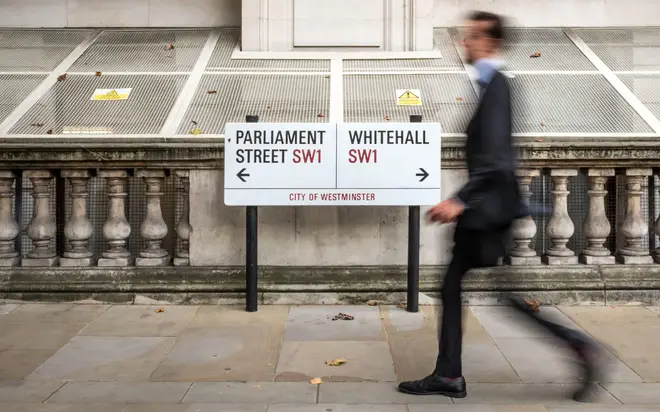
Nick Ferrari 7am - 10am
12 March 2024, 11:45 | Updated: 12 March 2024, 15:31

Nearly 100,000 extra civil servants have joined the civil service to deliver Brexit - but there's still no clear vision of what it should look like, a new report warns today.
Leaving the EU has led to a huge increase in staff in the Cabinet Office, Defra and Home Office, according to fresh research from the UK in a Changing Europe think tank.
The report, seen by LBC, says that Brexit has placed huge new pressures on devolved governments in Scotland, Wales and Northern Ireland.
Whoever wins the next election this year will still have to grapple with the realities of our vote to leave, despite Boris Johnson promising in 2019 to "Get Brexit done".
And there is a lack of a clear structure for how to coordinate post-Brexit policy, with a number of promised new regimes still not implemented.
Read more: Brexit Britain has 'significantly underperformed' compared to EU and US since 2016 referendum
Whitehall still lacks a central Brexit unit to coordinate policy, the report's authors say.
The Brexit Department was scrapped after the UK officially quit the block in 2020 - with responsibilities passing over to the Foreign Office and Cabinet Office.
It means that junior ministers are able to help push policy from the bottom up - but the "ministerial churn" of people moving through rules and a "lack of central direction" from the top of Government means Brexit policy is "incoherent and uncertain", they claim.
British politicians have been able to successfully take back control of our EU-based rules, they admitted.
But there has been "relatively little divergence" from the EU overall since we left.
The Brexit and the State report warns: "It is unclear how the transition of 2.8 million EU and EEA nationals from ‘pre-settled status’ to ‘settled status’ will be handled.
"The new farm payments scheme has been slow and unwieldy to implement.
"There have also been repeated delays to the imposition of full checks at the GB-EU border, and to the implementation of new GB regimes for chemicals registration and product standard marks."
The report says implementing our post-Brexit state, eight years on from the referendum, is still "very much a work in progress".
Professor Anand Menon Director, UK in a Changing Europe, said: "No major party may want to talk about Brexit in the forthcoming election campaign. But, as this report makes clear, whoever forms the next government will nonetheless find many of the consequences of Brexit piling up in their in-tray.
"While the broad outlines of the UK’s long-term relationship with the EU may have been settled, ministers and officials are still grappling with the new demands Brexit has placed on the British state. Adapting to Brexit is still very much a work in progress."
Jill Rutter, Senior Research Fellow and one of the report's authors, added: “The government has never set a clear strategic direction for how it wants the UK to operate outside the EU. That vacuum means that the shape of the post-Brexit state is only now beginning to emerge piecemeal through unconnected decisions often forced by external constraints”.
A government spokesperson said: "This government is continuing to deliver post-Brexit freedoms at every opportunity.
"Since leaving the EU we have overhauled our immigration system, laying the path for us to deliver the largest ever drop in migration; revoked and reformed over 2,000 laws, with over 1,000 more planned this year, delivering more than £1 billion in savings for businesses and customers; increased the speed of access to key medicines for patients whilst capitalising on tax freedoms – including getting rid of the VAT on women’s sanitary products; and struck new trade deals with 73 countries, as well as the EU itself.
"We have done all this whilst continuing to drive forward a more productive and efficient public sector, and recently introduced a cap on Civil Service headcount to further drive efficiencies across government."